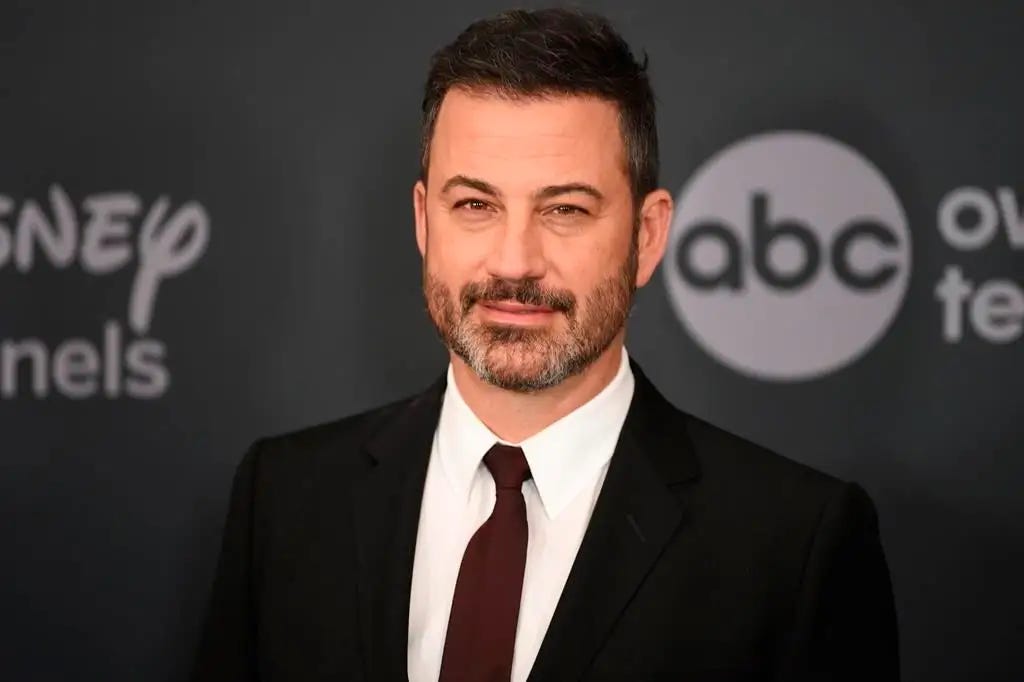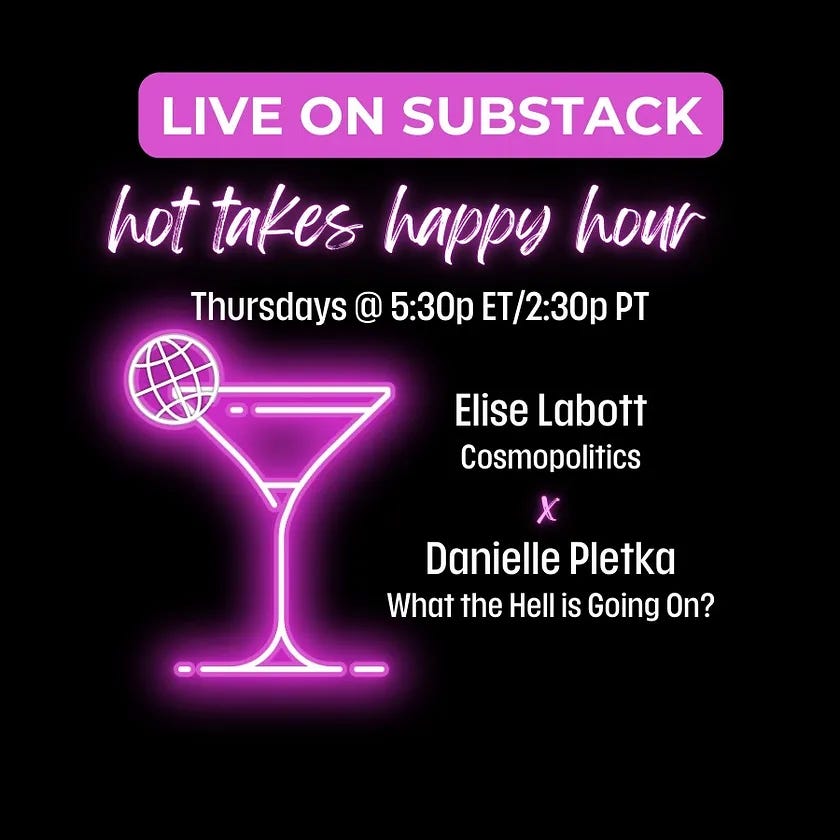Cosmopolitans: Dany and I are back TODAY at 5:30 ET with #HTHH and we will be talking about Jimmy Kimmel, as well as Charlie Kirk’s assassination and the events in the Middle East. We hope to see you there.
ABC didn’t pull Jimmy Kimmel off the air over an insensitive joke. It was the result of the latest chapter in a systematic campaign to transform American media—one that follows a script written not in Washington, but in Budapest.
In his Monday night monologue, Kimmel accused conservatives of trying to exploit Kirk's death for political gain, saying "We hit some new lows over the weekend with the MAGA gang desperately trying to characterize this kid who murdered Charlie Kirk as anything other than one of them and doing everything they can to score political points from it." He also mocked Trump's response to Kirk's death, saying it was not "how an adult grieves the murder of someone he called a friend" but rather "how a 4-year-old mourns a goldfish." The remarks, while crude in timing and tone, represented the kind of pointed political commentary that has long been a staple of late-night television—until corporate executives decided the financial and regulatory risks were too high.
The dominos fell with stunning speed on Wednesday. First, Nexstar Media Group—one of the largest owners of ABC affiliate stations in the country—announced it would pull Jimmy Kimmel's show from its 32 ABC affiliates, citing his Monday night comments about Charlie Kirk's assassination as "offensive and insensitive." Within hours, Disney-owned ABC capitulated entirely, announcing that "Jimmy Kimmel Live!" would be "pre-empted indefinitely." The rapid corporate surrender came after Federal Communications Commission Chairman Brendan Carr had threatened potential license revocations earlier in the day, demonstrating how quickly regulatory pressure can transform into media censorship.
Carr wasn't improvising. He was executing a strategy perfected by Hungarian Prime Minister Viktor Orbán, who has spent the last decade turning Hungary's once-vibrant media landscape into a propaganda machine.
The Hungarian preview
Orbán didn't seize control of Hungary's media overnight. He did it methodically, legally, and with a smile. First came the 2011 Media Act, which created a "Media Council" staffed entirely by his ruling party. The council could fine news outlets for coverage deemed "unbalanced or immoral"—vague language that meant whatever Orbán wanted it to mean.
Sound familiar? Carr's threats against ABC for "news distortion" echo this playbook perfectly. The terminology may be different, but the underlying principle is identical: regulatory agencies serving not as independent watchdogs but as political enforcers.
Next, Orbán's oligarch friends began systematically buying up newspapers, TV stations, and radio outlets. Editorial teams were fired, critical voices replaced with loyalists, and independent journalists found themselves unemployed. By 2018, nearly 500 media outlets had been "donated" to a central holding company run by Orbán's allies. Hungary still has elections, still calls itself a democracy, but the media chorus sings in perfect unison.
The genius of Orbán's approach isn't censorship—it's saturation. Why ban dissenting voices when you can simply drown them out?
The American adaptation
Trump's assault on American media follows the same blueprint, adapted for our constitutional system. Where Orbán used a Media Council, Trump deploys FCC Chairman Brendan Carr—a Project 2025 architect who threatened to revoke broadcast licenses if companies don't "straighten out" problematic hosts like Kimmel.
The lawfare strategy has proven devastatingly effective. Trump has filed defamation suits against The New York Times, CBS over a "60 Minutes" interview, and ABC News—extracting massive settlements even when his legal cases appeared weak. CBS parent Paramount just paid Trump $16 million to settle a dubious lawsuit—what Stephen Colbert aptly called "a big fat bribe" before his own show was canceled for so-called budgetary issues. Disney-ABC forked over $15 million. Meta wrote a $25 million check. These aren't legal victories; they're protection payments.
The intimidation extends beyond courtrooms. When ABC's Jonathan Karl asked about Attorney General Pam Bondi's plans to "go after hate speech," Trump responded with a direct threat: "We'll probably go after people like you because you treat me so unfairly. It's hate. You have a lot of hate in your heart." He then pointed to ABC's previous $15 million settlement, adding ominously, "So, maybe they'll have to go after you."
The chilling effect is immediate and intentional. When Nexstar Media Group—currently seeking FCC approval for a $6.2 billion merger—pulled Kimmel from its 32 ABC affiliates, it sent a crystal-clear message to every media executive in America: cross Trump at your own financial peril.
Meanwhile, Trump has systematically excluded legitimate news organizations from White House events while rolling out the red carpet for MAGA-friendly outlets. Real America's Voice, Steve Bannon's War Room, and Mike Lindell's Lindell TV now get preferential access, asking softball questions like whether Trump can share his fitness routine because he looks "healthier than ever." Or maybe he's just sleeping on a MyPillow.
Trump's gleeful response to Kimmel's suspension revealed the calculated nature of his media assault, celebrating what he called "Great News for America" while immediately pivoting to his next targets. "That leaves Jimmy and Seth, two total losers, on Fake News NBC," he posted on Truth Social, referring to Jimmy Fallon and Seth Meyers, before adding ominously, "Do it NBC!!!" The post demonstrated that Kimmel's takedown wasn't an isolated incident but part of a systematic campaign to eliminate critical voices from late-night television—one that Trump has been telegraphing for months and now expects other networks to replicate.
The weaponization of the FCC
The most dangerous element of Trump's strategy is his weaponization of supposedly independent regulatory agencies. The FCC is meant to ensure broadcasters serve the public interest, not the president's ego. But under Carr's leadership, it has become a political enforcement arm with an expansive view of what constitutes "hate speech."
Carr's threats aren't idle. He explicitly told podcast host Benny Johnson that media companies could face "fines or license revocations" if they don't comply with his vision of acceptable coverage. He urged local broadcasters to "push back" on Disney programming that "falls short of community values"—code for anything critical of Trump. When asked about potential "consequences" for The View hosts who have routinely criticized the administration, Carr ominously suggested they "aren't quite finished."
This represents a fundamental perversion of the FCC's mission—turning Constitution Day into a bitter irony. As Commissioner Anna Gomez, the lone Democrat on the commission, warned, the agency is "imposing never-before-seen controls over newsroom decisions and editorial judgment, in direct violation of the First Amendment."
Viktor Orbán used similar language about serving "community values" when his Media Council began fining outlets for unfavorable coverage. The most insidious aspect of the Orbán model is its veneer of legality. Nothing he did was technically illegal under Hungarian law—because he rewrote the laws. Elections still happen, opposition parties still exist, and some independent media survives. But the game is rigged so thoroughly that meaningful competition becomes nearly impossible.
Trump faces more constitutional constraints than Orbán, but he's adapting the strategy brilliantly. Corporate media executives, terrified of regulatory retaliation and bleeding money from cord-cutting and declining trust, are choosing capitulation over confrontation. Why fight expensive legal battles when you can simply write a check and fire the problematic host?
The speed of the collapse has shocked even experts who study democratic erosion. Georgetown's Gábor Scheiring, a former Hungarian MP who watched Orbán's takeover firsthand, noted to CNN that Colbert's cancellation followed exactly the same pattern: "legal warfare, regulatory capture and threats, financial pressures, and the new owner's apparent friendliness to Trump."
The next season
What makes this moment so scary is how normal it all seems. Kimmel's suspension was about one off-color joke about a tragic political assassination, as opposed to years of trolling the president. Colbert's cancellation was called "financial." The settlement payments are portrayed as smart corporate strategy. Each individual action appears reasonable until you step back and see the pattern.
The irony is particularly cruel—Charlie Kirk, whose assassination provided the pretext for Kimmel's suspension, built his career on open debate and persuasion. He went to hostile college campuses because he believed in the "art of persuasion" as fundamental to democratic discourse. Yet his death is being used to justify the exact opposite: shutting down debate and silencing critics.
Today marks Constitution Day—a fitting moment to reflect on how quickly constitutional principles can erode when regulatory agencies become political weapons and the First Amendment becomes a suggestion rather than a guarantee.
Orbán's success came partly because his opponents kept treating each attack as an isolated incident rather than part of a systematic campaign. Media owners "largely capitulated individually rather than mounting collective resistance," as Scheiring observed, enabling Orbán's "systematic capture strategy."
Viktor Orbán proved that you don't need jackbooted thugs to control the media. You just need regulatory capture, financial pressure, and enough corporate cowardice. Trump is proving the same formula works just as well in America.
American media executives face the same choice Hungarian ones did a decade ago: resist collectively and possibly preserve press freedom, or surrender individually and hope for mercy. So far, they're choosing surrender. Jimmy Kimmel's suspension doesn't exist in a vacuum—in the slow-motion collapse of press freedom, every capitulation makes the next one easier.
When media becomes a chorus singing in harmony with power, citizens lose their ability to make informed choices. Elections may continue, but democracy withers.
The Hungarian preview is over. The American show has begun.





Ms. Labott, good reporting. Do you think the Democrats see the light and are going to repent now that Trump is using their tactics against them? The country is in a world of hurt now that everyone is out to get each other. There are few good actors out there and they must be celebrated. And for every time Trump is pointed out as the extortionist, it is only right that Obama and everyone back through the "Progressive" era must be called out too. Back to first princuples: freedom, limited government and individual responsibility. See ya at 2:30. Take care.
See you then - will address this!